David McRaney's Blog, page 13
May 31, 2021
YANSS 207 – How a slight change of plans often leads to a major change of mind
Maya Shankar and her team recently reached out, noting that their new show, A Slight Change of Plans, which explores how various, fascinating people have changed their minds, often after something unexpected, shared the same interests and goals as You Are Not So Smart.
A Slight Change of Plans is hosted by Maya Shankar, a cognitive scientist “who studies how our minds work and how we change.”
Here’s the official description of the show: “There are few things in life that are as complex and messy—and potentially magical—as change. On A Slight Change of Plans, you’ll hear intimate conversations that give an unvarnished look into how people navigate changes of all kinds and use that change to ultimately grow. Maya uncovers little-known personal stories and reflections from familiar names like Hillary Clinton, Tiffany Haddish and Kacey Musgraves, and extraordinary stories from real-life inspirations, like a young cancer researcher in the throes of a stage 4 diagnosis and a Black jazz musician who convinced hundreds of KKK members to leave the Klan. Their stories and circumstances couldn’t be more different, but they all share one thing in common: life threw them a (slight) change of plans.
One of her guests, Megan Phelps-Roper, was recently a guest on this show, and Daryl Davis is one of her guests who You Are Not So Smart has long-wanted to feature. So, as podcasters do from time-to-time, Maya wondered if she could come on this podcast to promote her podcast, and seeing as our interests and obsessions and work and overall mission aligned so strongly, the answer was, “Absolutely!,” and this is that episode.

 Maya Shankar
Maya ShankarMaya Shankar is currently the Senior Director of Behavioral Economics at Google and is the creator, host, and executive producer of A Slight Change of Plans. Maya previously served as a senior advisor in the Obama White House, where she founded and served as chair of the White House’s Behavioral Science Team — a team of scientists charged with improving public policy using research insights about human behavior. In 2016, Maya served as the first behavioral science advisor to the United Nations under Ban Ki-moon.
Maya completed a post-doctoral fellowship in cognitive neuroscience at Stanford, after receiving a Ph.D. from Oxford on a Rhodes Scholarship and a B.A. from Yale in cognitive science. She has been profiled by the New Yorker and has been featured in the New York Times, Scientific American, Forbes, and on NPR’s All Things Considered, Freakonomics, and Hidden Brain. Maya is a graduate of the Juilliard School of Music’s pre-college division and is a former private violin student of Itzhak Perlman.
Download – iTunes – Stitcher – RSS – Spotify – Patreon – Soundcloud – Omny


Support the show directly by becoming a patron! Get episodes one-day-early and ad-free. Head over to the YANSS Patreon Page for more details.

Links and Sources
Download – iTunes – Stitcher – RSS – Spotify – Patreon – Soundcloud – Omny
May 18, 2021
YANSS 206 – How new research reveals narcissism isn’t excessive self-love but excessive self-loathing
In this episode we explore what narcissism is and what is most-definitely is not.
According to new research, there is a form of narcissism which has been, up until now, confused with psychopathy. But a new paper, the result of years of experiments, suggests narcissists are not psychopaths, and psychopaths are not narcissists.
In the psychological literature, narcissism comes in two varieties. Grandiose narcissists tend to really love themselves and heavily manipulate their social environment for personal gain. Vulnerable narcissists don’t love themselves, not their true selves. Vulnerable narcissists love their image, and they are highly aware of the fact that it is an image and work very hard to prevent anyone else realizing that. According to the research explored in this episode, there is no such thing as a grandiose narcissist -– that’s just another way to describe a psychopath.
All narcissism is what we traditionally classify as vulnerable narcissism, and though it took until 2021 to quantify this, to provide evidence, this is something that was predicted and explored in depth for years by a television show called Mad Men, whose main character is, easily, the greatest portrayal in fiction, ever, according this research, of what true narcissism really looks like, and we will explore that in this episode as well.
In fact, narcissism may even need to be renamed, because it isn’t excessive self-love, it’s excessive self-loathing. Narcissists like Don Draper in Mad Men cope with their insecurity by donning a mask, and then spend most of their lives protecting that mask out of a fear of what will happen if people ever see what it hides.
 [image error]
Mary Kowalchyk
[image error]
Mary KowalchykMary Kowalchyk is a Clinical Research Coordinator in the Department of Psychiatry at ISMMS. Her research interests include prodromal psychosis, self-image and world view in psychosis populations, and innovative treatment modalities. Twitter: @marykowalchyk
[image error] Pascal Wallisch“How do people construct the subjective reality they inhabit?” That’s the question at the center of the work of Pascal Wallisch, who studies how human beings differ in the their interpretations of the objective truth. He is a Clinical Associate Professor at the Department of Psychology at New York University. Twitter: @pascallisch


Support the show directly by becoming a patron! Get episodes one-day-early and ad-free. Head over to the YANSS Patreon Page for more details.

Links and Sources
Download – iTunes – Stitcher – RSS – Spotify – Patreon – Soundcloud – Omny
May 5, 2021
YANSS 205 – What we can learn about dialogue, persuasion, and change from those who have turned away from extremism
In this episode we sit down with Megan Phelps-Roper, the author of Unfollow, a memoir of her time in Westboro Baptist Church, and an exploration what it took to convince her to leave. I interviewed Megan for my upcoming book, How Minds Change, and in this interview you will learn all about assimilation and accommodation, cult deprogrammers, and the steps Megan says one must take if they want to change someone’s mind.


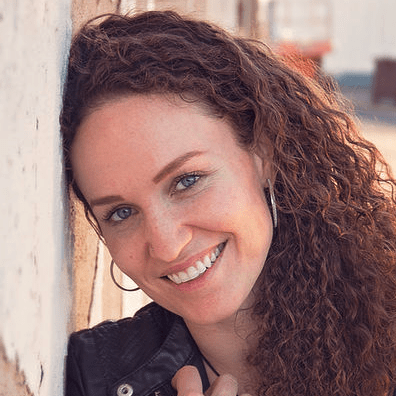 Megan Phelps-Roper
Megan Phelps-RoperFrom Megan’s official bio:
Megan Phelps-Roper was raised in the Westboro Baptist Church, the Topeka, Kansas church known internationally for its daily public protests against members of the LGBTQ community, Jews, other Christians, the military, and countless others.
As a child, teenager and early 20-something, she participated in the picketing almost daily and spearheaded the use of social media in the church. Dialogue with “enemies” online proved instrumental in her deradicalization, and she left the church and her entire way of life in November 2012. Since then she has become an advocate for people and ideas she was taught to despise — especially the value of empathy in dialogue with people across ideological lines.
She speaks widely, engaging audiences in schools, universities, faith groups, and law enforcement anti-extremism workshops. Her forthcoming memoir will be published on October 8, 2019, by Farrar, Straus and Giroux.
Praise for Unfollow:
“[Megan’s] intelligence and compassion shine throughout with electric prose…”
— Publishers Weekly (starred review)
“Wildly brave and incredibly thoughtful…This book will leave you holding your heart.”
— Sarah Silverman
“From her story, we can learn things sorely needed in our age: empathy, openness, and how we can best build bridges across divided lines.”
— Chris Anderson, Head of TED
“It is, quite simply, exactly what the world needs right now.”
— Mark Duplass
“If you want to see how a girl raised on religious fanaticism and sectarian hatred can be cured by the power of honest reasoning, read this book.”
— Sam Harris
“This is a beautiful, gripping book about a singular soul and an unexpected redemption.”
— Nick Hornby

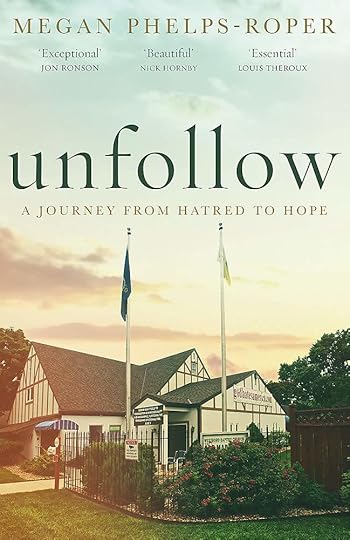
Amazon – Apple – Barnes & Noble – Indiebound – Audible
The activist and TED speaker Megan Phelps-Roper reveals her life growing up in the most hated family in America
At the age of five, Megan Phelps-Roper began protesting homosexuality and other alleged vices alongside fellow members of the Westboro Baptist Church in Topeka, Kansas. Founded by her grandfather and consisting almost entirely of her extended family, the tiny group would gain worldwide notoriety for its pickets at military funerals and celebrations of death and tragedy. As Phelps-Roper grew up, she saw that church members were close companions and accomplished debaters, applying the logic of predestination and the language of the King James Bible to everyday life with aplomb—which, as the church’s Twitter spokeswoman, she learned to do with great skill. Soon, however, dialogue on Twitter caused her to begin doubting the church’s leaders and message: If humans were sinful and fallible, how could the church itself be so confident about its beliefs? As she digitally jousted with critics, she started to wonder if sometimes they had a point—and then she began exchanging messages with a man who would help change her life.
A gripping memoir of escaping extremism and falling in love, Unfollow relates Phelps-Roper’s moral awakening, her departure from the church, and how she exchanged the absolutes she grew up with for new forms of warmth and community. Rich with suspense and thoughtful reflection, Phelps-Roper’s life story exposes the dangers of black-and-white thinking and the need for true humility in a time of angry polarization.


Support the show directly by becoming a patron! Get episodes one-day-early and ad-free. Head over to the YANSS Patreon Page for more details.

Links and Sources
Download – iTunes – Stitcher – RSS – Spotify – Patreon – Soundcloud – Omny
YANSS 204 – Why belief is not a conscious choice and certainty is a feeling, not a conclusion
In this episode, we sit down with neurologist Robert Burton, author of On Being Certain, a book that fundamentally changed the way I think about what a belief actually is. That’s because the book posits that conclusions are not conscious choices and certainty is not even a thought process. Certainty and similar states of “knowing,” as he puts it, are “sensations that feel like thoughts, but arise out of involuntary brain mechanisms that function independently of reason.”
Download – iTunes – Stitcher – RSS – Spotify – Patreon – Soundcloud – Omny


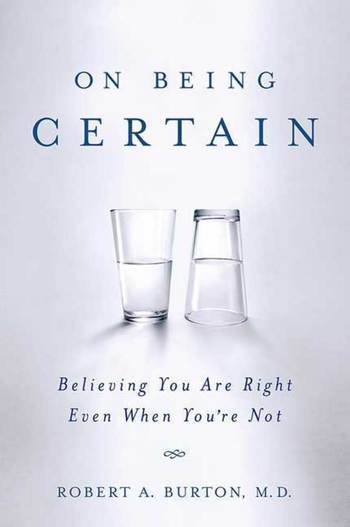
On Being Certain: Believing you are right, even when you are wron
g
Amazon – Barnes & Noble – Indiebound – Books-A-Million
FROM THE PUBLISHER:
You recognize when you know something for certain, right? You “know” the sky is blue, or that the traffic light had turned green, or where you were on the morning of September 11, 2001–you know these things, well, because you just do.
In On Being Certain, neurologist Robert Burton shows that feeling certain—feeling that we know something— is a mental sensation, rather than evidence of fact. An increasing body of evidence suggests that feelings such as certainty stem from primitive areas of the brain and are independent of active, conscious reflection and reasoning. In other words, the feeling of knowing happens to us; we cannot make it happen.
Bringing together cutting-edge neuroscience, experimental data, and fascinating anecdotes, Robert Burton explores the inconsistent and sometimes paradoxical relationship between our thoughts and what we actually know. Provocative and groundbreaking, On Being Certain challenges what we know (or think we know) about the mind, knowledge, and reason.
GO HERE TO LEARN MORE AND BUY THE BOOK AND ENJOY LIFE ITSELF


Support the show directly by becoming a patron! Get episodes one-day-early and ad-free. Head over to the YANSS Patreon Page for more details.

Links and Sources
Download – iTunes – Stitcher – RSS – Spotify – Patreon – Soundcloud – Omny
April 6, 2021
YANSS 203 – How to build a sailboat of self-actualization to explore the sea of human potential
In this episode, we sit down with Scott Barry Kaufman, one of the most-influential and prolific psychologists working today, to discuss his new book, Transcend: The New Science of Self-Actualization.
Business Insider magazine named Kaufman one of the “50 groundbreaking scientists who are changing the way we see the world,” and you would likely agree after hanging out with him. In my experience, you feel seen, heard, respected, challenged, and above all, when you leave a conversation with Scott, you do so feeling either like you must work on your purpose in life from that point on, or you must work to find it.
In the show, we discuss our shared desire to bring humanistic psychology back to the forefront and walk through Kaufman’s re-imagining of Maslow’s Hierarchy of Needs and trace Kaufman’s journey through Maslow’s unpublished journals about his unfinished theory of transcendence which Kaufman hopes to complete by picking up where Maslow left off just before his untimely death.

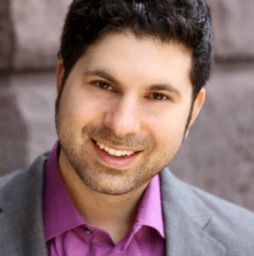 Scott Barry Kaufman
Scott Barry KaufmanFrom Kaufman’s official bio:
Hi, I’m Scott! I’m a humanistic psychologist exploring the depths of human potential. I have taught courses on intelligence, creativity, and well-being at Columbia University, NYU, the University of Pennsylvania, and elsewhere. I am interested in using my research to help all kinds of minds live a creative, fulfilling, and self-actualized life.
I like to share my enthusiasm and knowledge of the science of potential through my books, teaching, self-actualization coaching, podcast, blog, articles, and speaking engagements. If you are interested in receiving personal self-actualization coaching from me, you can fill out the application here.
My writing has appeared in The Atlantic, Scientific American, Psychology Today, and Harvard Business Review. In my latest book Transcend: The New Science of Self-Actualization, I present a new hierarchy of human needs for the 21st century, one that allows for the fulfillment of individual potential as well as the actualization of transcendent purpose and peak experiences.
I host the #1 psychology podcast in the world— The Psychology Podcast—which has received over 17 million downloads and was included in Business Insider’s list of “9 podcasts that will change how you think about human behavior.”

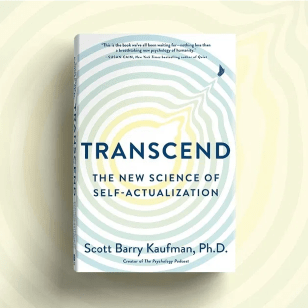
Transcend: The New Science of Self-Actualization
Amazon – Barnes & Noble – Indiebound – Audible
A bold reimagining of Maslow’s famous hierarchy of needs–and new insights for realizing your full potential and living your most creative, fulfilled, and connected life.
When psychologist Scott Barry Kaufman first discovered Maslow’s unfinished theory of transcendence, sprinkled throughout a cache of unpublished journals, lectures, and essays, he felt a deep resonance with his own work and life. In this groundbreaking book, Kaufman picks up where Maslow left off, unraveling the mysteries of his unfinished theory, and integrating these ideas with the latest research on attachment, connection, creativity, love, purpose and other building blocks of a life well lived.
Kaufman’s new hierarchy of needs provides a roadmap for finding purpose and fulfillment–not by striving for money, success, or “happiness,” but by becoming the best version of ourselves, or what Maslow called self-actualization. While self-actualization is often thought of as a purely individual pursuit, Maslow believed that the full realization of potential requires a merging between self and the world. We don’t have to choose either self-development or self-sacrifice, but at the highest level of human potential we show a deep integration of both. Transcend reveals this level of human potential that connects us not only to our highest creative potential, but also to one another.
With never-before-published insights and new research findings, along with exercises and opportunities to gain insight into your own unique personality, this empowering book is a manual for self-analysis and nurturing a deeper connection not only with our highest potential but also with the rest of humanity.
GO HERE TO LEARN MORE AND BUY THE BOOK AND ENJOY LIFE ITSELF


Support the show directly by becoming a patron! Get episodes one-day-early and ad-free. Head over to the YANSS Patreon Page for more details.

Links and Sources
Download – iTunes – Stitcher – RSS – Spotify – Patreon – Soundcloud – Omny
April 2, 2021
YANSS 202 – What wins when future desires and past beliefs refuse to agree?
Confirmation bias is our tendency to seek evidence that supports our beliefs and that confirms our assumptions — when we could just as well seek disconfirmation of those beliefs and assumptions instead.
It feels like we are doing the hard work — doing the research required to build good beliefs — but since we can so easily find that confirmation, when we stop searching at those moments when we think we have made sense of the world, we can grow ever more wrong over time.
This is such a prevalent feature of human cognition, that until recently a second phenomenon has been hidden in plain sight. Recent research suggests that something called desirability bias may be just as prevalent in our thinking.
Since our past beliefs and future desires usually match up, the desirability of an outcome is often twisted into our pursuit of confirmation like a single psychological braid — and here’s the thing: When future desires and past beliefs are incongruent, desire usually wins out.
Last year, psychologist Ben Tappin and his team were in hot pursuit of this new psychological beast, and they are about to publish a new study detailing their work.
In most psychological research in confirmation, desire isn’t measured at all. For instance, people who believe that capital punishment is a strong deterrent to crime tend to give more weight to information that matches their preconceived notions. The result is that when such people are presented with an equal amount of confirmatory and disconfirmatory evidence (capital punishment works versus capital punishment does not), they don’t balance out their beliefs. They instead become more entrenched in their original positions because they disregard the disconfirmatory info, leaving behind the confirmation, which they then use to reinforce their priors.
Ben and his team hypothesized that there may be more at play than pure confirmation in situations like this. People who believe that capital punishment is a strong deterrent to crime also want to believe that capital punishment is a strong deterrent to crime. Their raw factual assumptions and their emotional investment are congruent.
Most of the time our beliefs and desires match up like this. You believe that your favorite fast food restaurant won’t give you food poisoning, and you want that to be true. Your past experiences have reinforced one aspect of your belief, and your future desire reinforces the other.
Tappin wanted to create a study in which the subjects’ beliefs and desires didn’t match up, and since the Trump vs. Clinton election was just getting started in the USA, they thought it would be a perfect opportunity. In this episode, you’ll learn what they discovered.

Download – iTunes – Stitcher – RSS – Patreon – Soundcloud – Omny – Spotify
 Support the show directly by becoming a patron! Get episodes one-day-early and ad-free. Head over to the YANSS Patreon Page for more details.
Support the show directly by becoming a patron! Get episodes one-day-early and ad-free. Head over to the YANSS Patreon Page for more details.

Links and Sources
Download – iTunes – Stitcher – RSS – Patreon – Soundcloud – Omny – Spotify
Why We Are Poles Apart on Climate Change
You’re Not Going to Change Your Mind
The heart trumps the head : Desirability bias in political belief revision
YANSS 201 – How dogs change our behaviors, our brains, and our lives (for the better)
In this episode we sit down with journalist and author Kate Leaver to explore her new book, Good Dog, which covers “the science and history of our extraordinary relationship with dogs and focusing on the role that dogs can play in enriching and improving our mental and emotional health.”
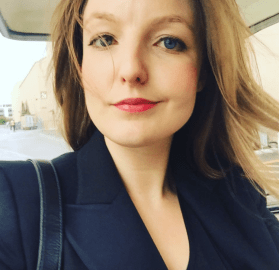 Kate Leaver
Kate LeaverKate Leaver is a journalist, author, speaker and branded content specialist.
Her first book, The Friendship Cure (2018) was published in Australia, New Zealand, the US and the UK. Her second book, Good Dog, is out with Harper Collins in Australia and New Zealand. It is set for release in 2021 in the UK and US.
As a journalist, Kate writes for The Guardian, The Independent, The Telegraph, Glamour, British Vogue and Refinery29, and is a columnist for Metro online.
Kate is from Australia, where she was features editor at Cosmopolitan magazine, senior editor at Mamamia and radio producer for Ross Greenwood.
Kate regularly appears on TV and radio. She’s been on BBC Woman’s Hour, BBC 5 Live, BBC London, Channel 4 News, Talk Radio, ABC TV, ABC Radio National, ABC 702, Triple J, The Today Show, The Daily Edition, News Breakfast, The Project and Studio Ten. She has done branded content work for Bumble, Dove, Fairmont Hotels, Nissan and Lindemans.
TWITTER: @kateileaver

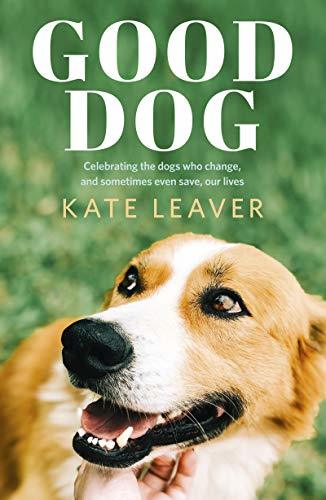 CELEBRATING THE DOGS WHO CHANGE AND SOMETIMES EVEN SAVE OUR LIVES
CELEBRATING THE DOGS WHO CHANGE AND SOMETIMES EVEN SAVE OUR LIVESCelebratory, joyous and moving, this is a book about the profoundly healing, curative qualities of dogs – and how we need dogs in our lives more than ever.
The dog-human bond is the most extraordinary cross-species friendship on the planet. Dogs give people so much: affection, companionship and profound emotional support. Now, more than ever, we can see the clear health benefits of living with a dog by our side.
Drawing on science, research and in-depth personal interviews, Good Dog demonstrates how vastly a dog can improve our mental and physical health as well as our quality of life. Kate Leaver begins by telling the story of how she met her beloved rescue shih tzu, Bertie, and how powerfully he helps her through periods of depression. Then she meets 10 other remarkable dogs who’ve changed human lives – from Missy the pug, who helps 11-year-old Cody live his best life despite his autism diagnosis, to Pip, who helps her teenage owner manage diabetes, and Jingles, who works with inmates in a prison. With each story, it becomes more and more obvious how profoundly dogs can support us, comfort us and even save our lives.
This is a book for anyone who has ever loved a dog – and known their love in return.
GOOD DOG was published by Harper Collins Australia in April 2020. It comes out with Harper Collins 360 in the UK and US in early 2021.
A recent poll showed that more than one-third of U.S. citizens would not get a COVID-19 vaccine if it was offered right now, for free.

Download – iTunes – Stitcher – RSS – Patreon – Soundcloud – Omny – Spotify

Support the show directly by becoming a patron! Get episodes one-day-early and ad-free. Head over to the YANSS Patreon Page for more details.

Links and Sources
Download – iTunes – Stitcher – RSS – Patreon – Soundcloud – Omny – Spotify
How my dog helped me through the darkest of times
Music: Espanto, Espanto, and Caravan Palace
February 22, 2021
YANSS 200 – How a divisive photograph of a perceptually ambiguous dress led two researchers to build the nuclear bomb of cognitive science out of socks and Crocs
When facing a novel and uncertain situation, the brain secretly disambiguates the ambiguous without letting you know it was ever uncertain in the first place, leading people who disambiguate differently to seem iNsAnE.
This episode is about why we so often don’t understand why we disagree, which leads us to disagree even more, and we explore that through the science behind The Dress. We look into why some people see it as black and blue, others see it as white and gold, and how the scientific investigation of why that is led to the scientific investigation of socks and Crocs, and how the scientific investigation of socks and Crocs may be, as one researcher explains, the nuclear bomb of cognitive neuroscience.

 “How do people construct the subjective reality they inhabit?” That’s the question at the center of the work of Pascal Wallisch, who studies how human beings differ in the their interpretations of the objective truth. As part of that work, he has been the go-to scientist when it comes to making sense of The Dress, the Yanny/Laurel illusion, and several other viral phenomena on the internet. In 2017, he produced a study explaining exactly why some people saw the dress as one color, and others saw it as another. And in 2019, he produced another study replicating the conditions of the dress in the lab using socks and Crocs.
“How do people construct the subjective reality they inhabit?” That’s the question at the center of the work of Pascal Wallisch, who studies how human beings differ in the their interpretations of the objective truth. As part of that work, he has been the go-to scientist when it comes to making sense of The Dress, the Yanny/Laurel illusion, and several other viral phenomena on the internet. In 2017, he produced a study explaining exactly why some people saw the dress as one color, and others saw it as another. And in 2019, he produced another study replicating the conditions of the dress in the lab using socks and Crocs.
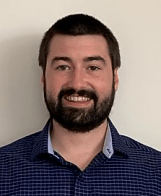 Michael Karlovich is a cognitive scientist and vision researcher who explores “computational methods to create digital art, and to combine these novel methods with principles of visual-neuroscience and gestalt psychology to produce visual displays that ‘captures the brain’s attention,’ and further, produce positive impressions within a majority of viewers.”
Michael Karlovich is a cognitive scientist and vision researcher who explores “computational methods to create digital art, and to combine these novel methods with principles of visual-neuroscience and gestalt psychology to produce visual displays that ‘captures the brain’s attention,’ and further, produce positive impressions within a majority of viewers.”

Download – iTunes – Stitcher – RSS – Patreon – Soundcloud – Omny – Spotify
 Support the show directly by becoming a patron! Get episodes one-day-early and ad-free. Head over to the YANSS Patreon Page for more details.
Support the show directly by becoming a patron! Get episodes one-day-early and ad-free. Head over to the YANSS Patreon Page for more details.

Links and Sources
Download – iTunes – Stitcher – RSS – Patreon – Soundcloud – Omny – Spotify
The Debate that Broke the Internet
The Drama that Divided the Planet
Exploring the Roots of Disagreement with Crocs and Socks
View this post on InstagramA post shared by David McRaney (@davidmcraney) on Dec 15, 2019 at 2:42pm PST
 There are no red pixels in this created by Akiyoshi Kitaoka
There are no red pixels in this created by Akiyoshi Kitaoka

YANSS 199 – How to explore the mystery and wonder of complex mathematical concepts without using numbers
In this episode we explore the weirdness and wonder of Math Without Numbers with mathematician Milo Beckman who wrote a book about the math behind multiple infinities, strange topologies, and extra dimensions, all without using numbers to explain some of the most fascinating and complex ideas that usually only make sense when scribbled in strange notations on a blackboard.
“What’s bigger than infinity? How many shapes are there? And when will I use this in real life? The questions you were afraid to ask do have answers.
(But they aren’t numbers).”
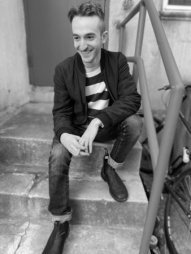 Milo Beckman
Milo BeckmanMilo Beckman has been addicted to math since a young age. Born in Manhattan in 1995, he began taking math classes at Stuyvesant High School at age eight and was captain of the New York City Math Team by age thirteen. His projects and research have been featured in the New York Times, FiveThirtyEight, Good Morning America, Salon, the Huffington Post, the Chronicle of Higher Education, Business Insider, the Boston Globe, Gothamist, the Economist, and others. He worked for three tech companies, two banks, and a US Senator before retiring at age nineteen to teach math in New York, China, and Brazil, and to work on this book.
 PRH Audio · Math Without Numbers by Milo Beckman, read by Soneela Nankani
PRH Audio · Math Without Numbers by Milo Beckman, read by Soneela Nankani

Support the show directly by becoming a patron! Get episodes one-day-early and ad-free. Head over to the YANSS Patreon Page for more details.

Links and Sources
Download – iTunes – Stitcher – RSS – Spotify – Patreon – Soundcloud – Omny
February 4, 2021
YANSS 198 – The psychological mechanisms that led to the the storming of the Capitol, an event that sprang from a widespread belief in a conspiracy theory that, even weeks later, still persists among millions
Since 2016, psychologist Gordon Pennycook and his colleagues have consistently found that a lack of cognitive reflection is more correlated with believing and sharing fake news and conspiracy theories – false information spread through Facebook, and espoused by the president himself – than any other psychological phenomenon.
In this episode we explore how, why, and what can be done about it after taking a deep dive into some shocking statistics.
Download – iTunes – Stitcher – RSS – Soundcloud – Omny – Spotify
According to VOX: “In a survey fielded in the days after a group of President Donald Trump’s supporters stormed the US Capitol (January 8 to 11), 72 percent of likely Republican voters said they continue to question the presidential election results. Nearly three-quarters of Republicans, or 74 percent, said allegations of voter fraud have contributed to these concerns. Those are overwhelming majorities, but even among independents, 42 percent said they do not currently trust the election results.”


 Gordon Pennycook
Gordon PennycookGordon Pennycook is an assistant professor of behavioural science at University of Regina’s Hill/Levene Schools of Business. He is a member of the editorial board for Thinking & Reasoning and a consulting editor for Judgment and Decision Making. He studies misinformation any how is spreads through the modern information ecosystem.

Links and Sources
Download – iTunes – Stitcher – RSS – Spotify – Patreon – Soundcloud – Omny
Examining false beliefs about voter fraud in the wake of the 2020 Presidential Election
How a Crisis Researcher Makes Sense of Covid-19 Misinformation
Transcript of an interview with Steven Novella
About half of Republicans don’t think Joe Biden should be sworn in as president
Meta-Analysis of Psychological Research on Conspiracy Beliefs
David McRaney's Blog
- David McRaney's profile
- 582 followers



